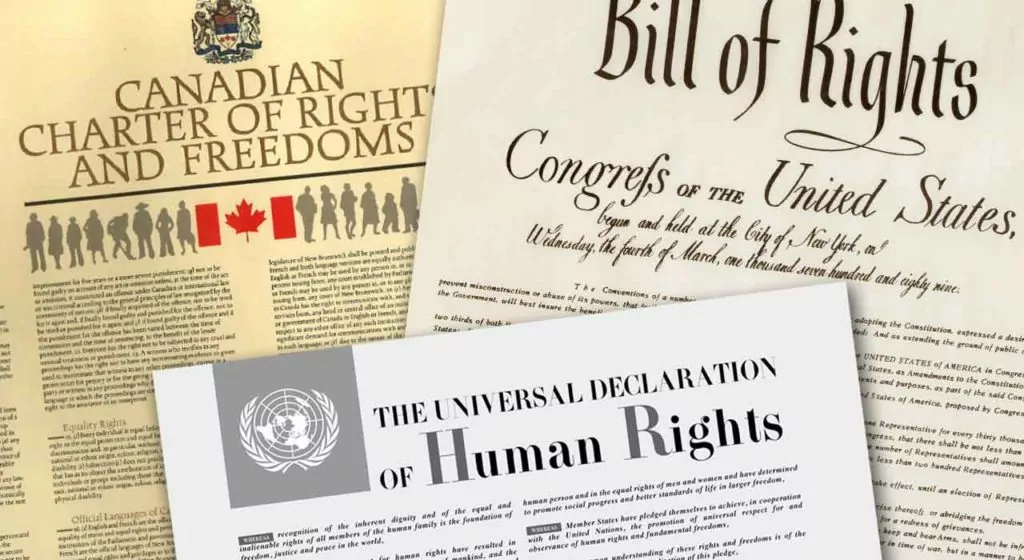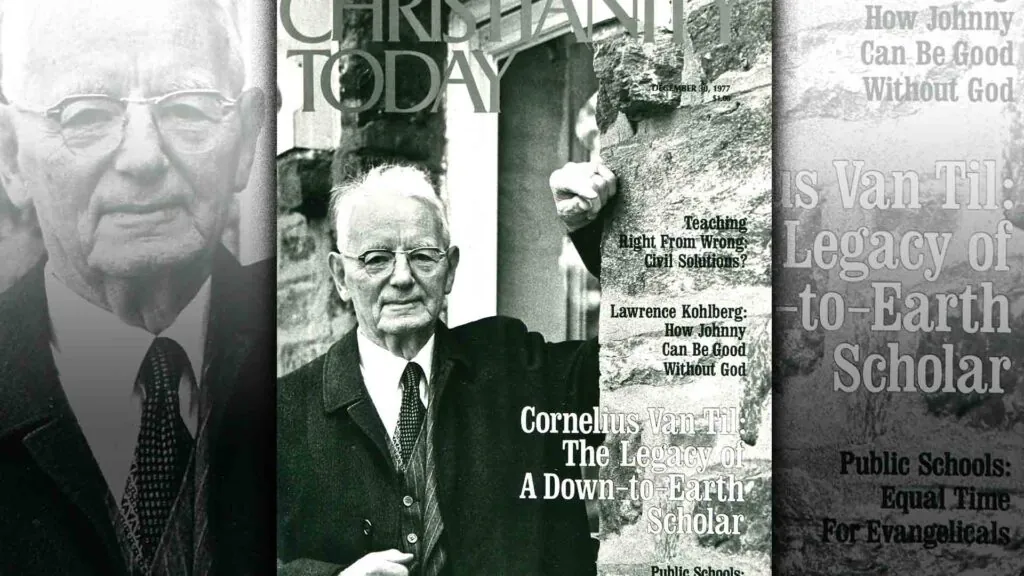Do human rights need God? Bluntly stated, it all depends on your god.
Those who reject that there is a God, say human beings are responsible for their own destiny and create our own morals… and even our own rights.
What the State gives the State can take away
But the standard secular account of human rights is mistaken. What is widely overlooked today is that a worldview based on godless evolution cannot provide a reasonable foundation for either the universality or the permanence of human rights. How can relativism, so prevalent in the West, guarantee human rights? Philosopher Jacques Ellul properly warned us that it cannot protect “established human rights…against arbitrary power or against totalitarian definitions of right and wrong.”
The truth is that human rights issues are deeply religious issues and therefore the God question cannot be avoided.
But won’t basing human rights on God lead to a theocracy?
Not if we keep in mind what belongs to God and what belongs to the State. As the church father Tertullian (c.160-230) pointed out: “Render to Caesar money. Render to God yourself. Otherwise, what will be God’s, if all things are Caesar’s?” In other words, the State does not bestow human rights, but it does have a duty to recognize and safeguard these rights. It must protect not only specific political rights like (like voting) but also non-political rights such as the right to worship, freedom of association, parental choice in education, and so forth.
Universal human rights only make sense when they are grounded on God
We can make a compelling argument in a secular society for human rights which are originally from God and finally vindicated by God. As Christians our starting point is the Bible; it is the foundation for our thoughts and actions. So does the Bible offer a working perspective of human rights? And if so, what is it?
The idea of human rights is not actually mentioned anywhere in the Bible, yet it is present everywhere. In clear language the Bible speaks to us about right and wrong, about good and evil, about God’s law which is finer than gold and sweeter than honey, about doing justice to the poor, the needy, the orphans, and those who have no helper, about not withholding wages of your hired laborer, about showing mercy and doing justice to foreigners and sojourners, about doing good even to your enemies.
Rights come from God’s prohibitions
The Bible also speaks of divinely inspired duties, including the Ten Commandments, which, when taken to their ultimate conclusion, form the basis of what we today would call human rights. The commandment, “You shall not murder,” teaches that human life is sacred and implies that there is a right to life. However, the Commandments are formulated as human obligations to God and not as explicitly conferring tangible rights or benefits upon humanity.
That said, the Commandments do, in fact, provide a philosophical basis for putting a high value on humans. And Jesus said that human duties to God are ultimately reduced to two: Love God with one’s whole being, and love others as oneself (Matt. 22:34-40).
The Bible deals with human nature and with personal relationships more than with specific problems. But much of its teaching nonetheless expressly bears on public policy concerns. This is seen in the role of the Old Testament prophets. Kings were reminded of their violation of God’s law that protected the rights of weaker members of their society. The prophet Nathan rebuked King David for violating the rights of Uriah (2 Sam. 12:7-10). Elijah’s rebuked King Ahab for violating the right of Naboth (1 Kings 21:17-22). Both Nathan’s rebuke and Elijah’s rebuke were taken seriously because David and even Ahab were rulers of Israelites’ society that still recognized God’s law and judgment.
Not from our abilities, status, or age, but from in Whose image we are made
The most basic issue at stake in the concern for human rights can be phrased very simply with the question, “What is man?” The undergirding rationale for all human rights is the fact that each one of us has been created in the image of God. The Roman teacher Lactantius (c.250-325 AD) noted, “We call everyone together to the heavenly pasture, without any distinction either of sex or of age” (cf. Gal. 3:28).
Each person is highly valued in the sight of God. In fact, when a person’s basic right to life is violated, God’s right is violated. The Bible declares that any assault on another person is taken as an assault on God Himself. And He will ultimately vindicate the innocent and punish the criminal (Gen. 9:5-6).
This concept of human dignity, as well as the ideas of justice, righteousness, and human freedom (especially freedom from oppression) flows from Scripture’s high view of human beings. Consequently, we insist on the universal dignity, rights, and responsibilities of all human beings. When human beings are no longer seen as God’s image-bearers, they will be treated as mere objects, products of evolution, a collection of molecules. As the Christian apologist Tatian (c.160) aptly commented,
“Man is not, as the croaking philosophers say, merely a rational animal, capable of understanding and knowing… Rather, man alone is the image and the likeness of God.”
The special status of a human being does not depend on his or her age, race, size, stage of development, or condition of dependency. Each person is made in the image of God, and endowed with dignity (Ps. 8). Each human being is, therefore, a person possessed of a dignity we are obliged to respect by virtue of being created in the likeness and image of God. And each person is both an individual and communal creature, who lives beneath God’s sovereignty, answerable to his norms of justice, stewardship, and love. The right to dignity demands that we treat all human beings with dignity. This includes protecting the rights of those with whom we disagree.
Rights must be tied to responsibilities
In much of human rights talk today, much is said about rights to this and that – people speak of a right to free post-secondary education, or government-provided abortion – while little is said about responsibility. God makes it clear, however, that we do not have rights for rights’ sake. Rights are tied to responsibility.
We must accept responsibility for what we do. Responsibility is about caring for others. And ultimately the cause of human rights is inseparably bound up with our responsibility to God (Ps.139). We cannot shirk our duty like Cain did, when he said to God, “Am I my brother’s keeper?”
As Ed Vanderkloet noted in his essay The Iron and the Clay in the Foundations of Human Rights:
“Man is first of all responsible to his Maker; his speech, his association, and all his action must be a response to God. It is here that the Christian and the humanist world-and-life view clash. For the creed of human autonomy does not allow for the element of responsibility to a sovereign God. If man is his own master and lawgiver, he is only responsible to himself.”
Why do human rights so often get violated?
Why are human rights so often violated? Why can’t the “reasoned intentions of all men of goodwill” bring about public justice and the renewal of society? Why can’t we all just get along?
This sometimes seems to be a bit of a mystery to non-Christians. But we know the reason: Adam and Eve rebelled against God. Sin now disrupts the good order and harmony of God’s creation. The curse of sinful transgression, of the broken covenant, and of the estrangement from God, fellowmen, and the world, now hangs over all human relationships.
But the fall could not and did not destroy our responsibility to God. God maintains his righteous claims upon us even in a broken world. Do human rights need God? Yes, as only God can counter human sin.
In becoming Man, Christ showed how much God values Man
At the heart of the Christian view of human rights is Jesus Christ. He is God’s answer for fallen human beings. In the midst of history is the cross, the liberating power of his resurrection, and his glorious ascension to a position of regal authority. There is no righteousness apart from Him. In Christ God became man and as the God-man, the long-awaited Messiah, He reveals perfectly the divine image (Col. 1:15), restoring the image of God in us.
The doctrine of the Incarnation demonstrates the ultimate worth of human beings (John 3:16). Jesus Christ, both fully God and fully human, concretely lived in the midst of time and space. Through Jesus, the New Testament shows God’s interest in people from all segments of society – Jesus demonstrated respect to the outcasts of society.
So how do we practice true (James 1:26-27) religion? We turn to the Bible. It is the Word of Him who is the Way, the Truth, and the Life (John 14:6). He is the Way we are to walk, the Truth we are to believe, the Life we are to live. The apostle Paul exhorts us to fulfill “the law of Christ,” which means assuming the obligation “to bear one another’s burdens” (Gal. 6:2). The claims of love are at the heart of the “law of Christ.” As Justin Martyr observed, “All of us pray for you, and for all men, as our Christ and Lord taught us to do. For He commanded us to pray even for our enemies, and to love those who hate us, and to bless those who curse us.”
Will we ever gain a world where all human rights are perfectly respected? The Bible is clear. A perfect world will only come when our Lord returns. With one eye scanning the clouds, watchful for our Lord’s return, we are to fix our other eye on the needs of our fellow image-bearers around the world. Therefore, here and now we do what is right in God’s sight. And Christ entrusts the Church with the great commission as the supreme “declaration of human rights” – the right and responsibility of all people to hear and believe the gospel, and the right and responsibility of his disciples to proclaim it (Matt.28: 18-20).
The Church’s role
The Church is the community of saints from every nationality, class, and race. As public light, salt, and leaven, she can make a positive contribution to human rights, showing concern for the public good. As she presents the Gospel of salvation to a spiritually lost world, she has also the task to equip the people of God, both personally and communally, to serve as fervent advocates of justice, peace, and compassion in every sector of life.
And the Church has a unique position in the world. When one part of the Church suffers, there will be voices of encouragement from other parts; when another part of the Church becomes too comfortable with status and power, a word of admonition will be forthcoming. And the Church has made a difference for the good in many parts of the world. For all the ambiguities, foibles, and outright betrayal of Christianity’s own best principles, the Word and Deed Gospel has opened the door to the development of dynamic pluralistic democracies which protect human rights of both persons and groups. The record shows that the Church opened her heart to the needy, cared for the poor and hungry, ministered to the enslaved and imprisoned, established orphanages and centers of learning, generated movements for societal reform, offered diaconal assistance, and sponsored programs of world relief.
Already in the first centuries of the Christian era, the Church sought the public good. For example, Lactantius wrote, “It is an equally great work of justice to protect and defend orphans and widows who are destitute and stand in need of assistance. Therefore, the divine law commands this to everyone.” Christians opposed and condemned the culturally imbedded custom of child abandonment. The 2nd-century Church father Clement of Alexandria condemned the Romans for saving and protecting young birds and other creatures while lacking moral compunctions about abandoning their own children. But the early Christians did more than condemn child abandonment. They frequently took these child castaways into their homes and adopted them. Despite all the persecutions suffered, they did not relent in promoting the sanctity of human life. Their persistent efforts eventually paid off. When Emperor Valentinian outlawed infanticide in 374, he also criminalized child abandonment.
Conclusion
Do human rights need God? Yes. The infallible Scripture of the Triune God gives shape to human rights issues. Human rights in the biblical perspective are rights given by the grace of God, recalling us to our task to make things right in this world just as Zacchaeus did: ” If I have defrauded anyone of anything, I restore it fourfold” (Luke 19:8).
As believers in the pursuit of human rights, we must maintain an independent prophetic voice. As Vanderkloet noted:
“We should realize that the humanist and Christian concepts of justice and rights are as incompatible as iron and clay….To build our political order on a foundation of those [humanist] ingredients is acting like the man who built his house upon the sand. Such foundations will crumble and cause the collapse of the structure when the winds and floods of new ideologies arise and beat against it.”
Rev. Johan Tangelder (1936-2009) wrote for Reformed Perspective for 13 years. Many of his articles have been collected at Reformed Reflections. A version of this article first appeared in the June 2008 issue.











